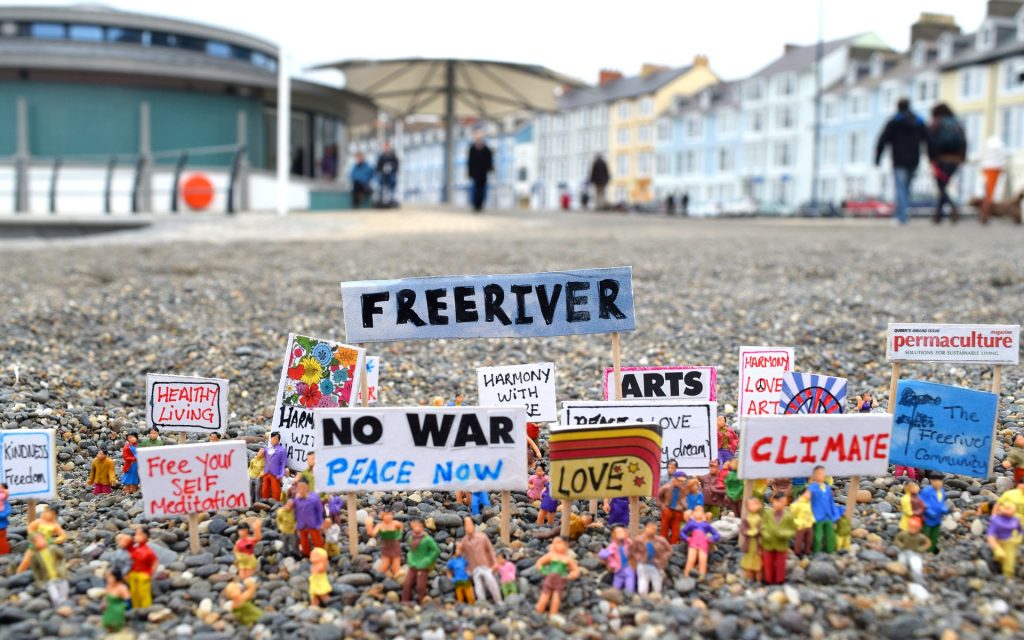
Here we are again, entering a new year with much meditation about the year that passed and expectations about what is to come. The new year also seems to acquire added weight as it represents the beginning of a new decade. This last year of the decade was marked primarily by the power of one and the voices of many as well as geopolitical uncertainties.
The power of one is symbolized through the actions, words, and presence of Greta Thunberg, the 17 year old Swedish teenager who has continued to mobilize a growing segment of the world’s population on the evils of climate change and the need to fundamentally alter our ways as humanity’s very existence is threatened. Greta has become a symbol of hope that collective action is possible albeit the resistance of habit, a large swatch of big business that refuses to adapt, and the inability of governments to meet their agreed upon targets in reducing their countries’ carbon footprints as epitomized by the failure of the climate change summit in Madrid in December.
Nevertheless, Greta Thunberg keeps inspiring and the bottom up approach that is taking hold as a result of her action is beginning to show resilience and commitment to force fundamental change to limit the global rise in temperature to 1.5 degrees Celsius as per the Paris Climate Change Agreement of December 2015. The politicization of climate action has now become a fact.
The power of many is exemplified both with global society’s mass wake up call to combatting climate change as well as with the mass protest movements in favor of reform in many countries. Whether the triggers were corruption, poor economic growth, political economy, or personal and collective freedoms, these mass protests are fundamentally reshaping the relations between societies and their elites as they reflect social injustices, generational cleavages, and anger at the ineptitude of state institutions to channel legitimate demands for change. Their reach has been global and varied. They range from the mass protests in early 2019 in Algeria where some 3 million people took to the streets demanding an overhaul of the regime following the announcement that the partially incapacitated president would seek a fifth term in office, eventually leading to a presidential election in December, to protests against election fraud in Bolivia leading to the fleeing of the country’s embattled president Evo Morales to Mexico in November .
The protest movements will undoubtedly continue to go strong in various forms and over a number of issues in 2020 and beyond, and will have an impact on governance at local, national, regional, and global levels.
In October, in Chile, hundreds of thousands took to the streets with demands for income equality, better health care, and more money for education, while more than 250,000 have been protesting since November in Colombia over corruption and the killing of human rights activists. Mass and in many cases deadly protests, invariably for different reasons, have also rocked the Czech Republic, France, Egypt, Iran, Iraq, Lebanon, Haiti, Ecuador, Indonesia, Russia, and Spain while the protests that started in March in Hong Kong have turned into a sustained pro-democracy movement.
The protest movements will undoubtedly continue to go strong in various forms and over a number of issues in 2020 and beyond, and will have an impact on governance at local, national, regional, and global levels. The ongoing protests in January 2020 both in Lebanon and Iran are cases in point. In other words, we see both the emergence of a new transactional global order, which the liberal multilateral post-World War II order seems unable to cope with, as well as societies, whether in developed or developing countries, uneasy with their state of being.
Challenges Ahead
As we enter 2020, and the United Nations will be celebrating its 75thyear in existence, the tensions between the need for more multilateralism and reformed global governance as well as the growing re-nationalization of key international state actors will become even more evident. The trials and tribulations of the United Nations are being experienced in other postwar institutions such as NATO and the European Union as both are being contested from within in part due to transactionalism and the fluidity of the global order. The status quois being challenged nominally and palpably both by state actors and their representatives in their dual capacities as heads of state or government and domestic political actors with far ranging systemic ramifications.
The tortuous road to Brexit is a case in point as it fundamentally impacts Britain which finds itself in the midst of a seismic political tug-of-war between its main political parties as well as among its constituent parts and its role as a go-alone middle power in a world of a growing number of go-alone middle powers. While its impact on the European Union itself has yet to be clearly rationalized, it will nevertheless be felt as the Union itself is in the midst of change.
The fluidity of the global order and the evolving nature of the transatlantic relationship have led to calls for a more global and geopolitical Europe with more strategic autonomy and defense capabilities with a far greater realist mindset than ever before, while it is facing endogenous challenges to its governance model on two fronts.
The first is the need for a proper and orderly realignment between its elite-driven and successful integration project and its co-ownership by its peoples and societies. In other words, the democratic deficit is becoming more marked as economic growth continues to be unsteady, social tensions remain high, employability prospects are threatened by technological change, and the perception of inequality and corruption is widespread.
The European Union finds itself in the midst of a consequential renationalization process from which it will hopefully be able to forge a new integrationist consensus.
The second, in part as a consequence of the aforementioned growing elite-societal divide, is the shifting balance of power towards national capitals, thereby weakening the Brussels’ supranational and multilateral institutions, and making much needed consensus both in terms of the social agenda and foreign policy and strategic priorities more difficult. In other words, the European Union finds itself in the midst of a consequential renationalization process from which it will hopefully be able to forge a new integrationist consensus.
On the other side of the Atlantic, the banana-republic-type antics of the Trump administration throughout 2019 are reflective of a deep political chasm in the country and the limits of maintaining the constitutionally promulgated separation of powers between the executive, legislative, and judicial branches. They also increasingly reflect a type of Orwellian doublespeak or ‘consistent inconsistency’ on the international arena that tests ties with allies (or those that think they are allies) and with those that are not. Again, here the ramifications are nothing short of seismic as reflected in the turmoil within the NATO on how to deal with Russia and, particularly, China, among others. The prospects of Donald Trump winning a second term in November 2020 implies more confusion on the international arena and the obvious search for alternatives by some partner countries thereby heightening the prospects for regional tensions. Yet even if the victor were one of his Democratic Party rivals, steering the ship towards a sort of status quo antewith a modicum of rationality, remains a tall prospect.
A case in point is the swamp-like dynamics in the Eastern Mediterranean which threaten regional security as neighboring states such as Turkey, Greece, Cyprus, Israel, and Egypt, among others, of which many are, in theory and as a matter of fact, on the same side of the strategic divide at odds with each other, in part due to Washington’s dithering as well as due to domestic political considerations. Consequently, the traumas that have shaped many of these countries refuse to heal and tension levels threaten both the framework that has been painstakingly negotiated and developed to resolve the Cyprus conflict and to completely tear asunder the rapprochement process that has been the glue keeping Greece and Turkey diplomatically, politically, and economically engaged with each other since 1999. In this world, hydrocarbon finds defy logic and tend to divide rather that unite while refugees become dehumanized and instruments of divisive discourse and foreign policy making while arms races take center stage.
Vigilance and concerted action, thus, must take center stage, lest the evolving geopolitical vagaries take a turn for the worst. The world is undoubtedly on the cusp of change, or maybe even in the midst of it, but how this change is managed remains the challenge for peoples, nations, and institutions alike in 2020 and beyond.
_______________________________________________________________________________________________

Dimitrios Triantaphyllou is Associate Professor of International Relations and Director of the Center for International and European Studies at Kadir Has University. He is a longstanding member of the Greek-Turkish Forum and a co-Chair of the Commission on the Black Sea. His current areas of research include European Foreign Policy, Black Sea security, transatlantic relations, Greek-Turkish relations, and sustainable development.

